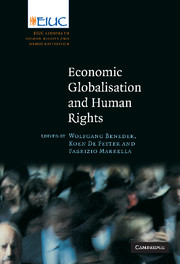Book contents
- Frontmatter
- Contents
- List of contributors
- Series editors' preface
- Preface
- List of abbreviations
- Introduction
- PART I Inter-disciplinary Perspectives on Human Rights and Economic Globalisation
- PART II The Relevance of Human Rights for International Economic Organisations
- PART III International Corporate Accountability
- Alternative Perspectives on International Responsibility for Human Rights Violations by Multinational Corporations
- Human Rights, Arbitration, and Corporate Social Responsibility in the Law of International Trade
- General Conclusions
- Index
General Conclusions
Published online by Cambridge University Press: 09 July 2009
- Frontmatter
- Contents
- List of contributors
- Series editors' preface
- Preface
- List of abbreviations
- Introduction
- PART I Inter-disciplinary Perspectives on Human Rights and Economic Globalisation
- PART II The Relevance of Human Rights for International Economic Organisations
- PART III International Corporate Accountability
- Alternative Perspectives on International Responsibility for Human Rights Violations by Multinational Corporations
- Human Rights, Arbitration, and Corporate Social Responsibility in the Law of International Trade
- General Conclusions
- Index
Summary
Human rights and the new economic realities
The phenomenon of economic globalisation, which is complemented by other forms of globalisation (e.g. cultural globalisation or legal globalisation), has created new opportunities for international economic affairs, but also new challenges for human rights. While the world has become smaller and more integrated since the end of World War II, the acceleration of the movement of people, capital and information and the decreasing costs of transportation and communication have not, in most cases, resulted in a reduction of the inequality of living conditions. They have, nonetheless, generated a broader sense of economic, political and moral interdependence at all levels of governance and in civil society. Today, more than ever, the systems of human rights protection need to deal with new international realities characterised by, inter alia, the reduction of borders, the facilitation of trade and investment, increased international interconnectedness and interdependence, the growing importance of non-state actors (transnational corporations, NGOs), but also intergovernmental organisations (IGOs) like WTO and International Financial Institutions (IFIs), and – foremost – the changing role of the State.
The developments described in the contributions of this volume, summarised under the multifaceted term ‘economic globalisation’, have contributed to a global interdependence that is enhanced by and is responsible for a re-definition of the functions of the State.
- Type
- Chapter
- Information
- Economic Globalisation and Human RightsEIUC Studies on Human Rights and Democratization, pp. 311 - 324Publisher: Cambridge University PressPrint publication year: 2007

